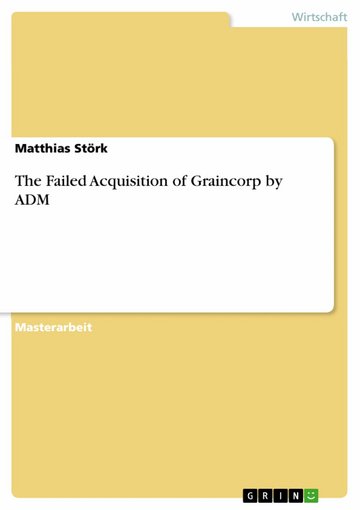The Failed Acquisition of Graincorp by ADM

| Autor | Matthias Störk |
|---|---|
| Verlag | GRIN Verlag |
| Erscheinungsjahr | 2015 |
| Seitenanzahl | 89 Seiten |
| ISBN | 9783656972976 |
| Format | ePUB/PDF |
| Kopierschutz | kein Kopierschutz/DRM |
| Geräte | PC/MAC/eReader/Tablet |
| Preis | 36,99 EUR |

| Autor | Matthias Störk |
|---|---|
| Verlag | GRIN Verlag |
| Erscheinungsjahr | 2015 |
| Seitenanzahl | 89 Seiten |
| ISBN | 9783656972976 |
| Format | ePUB/PDF |
| Kopierschutz | kein Kopierschutz/DRM |
| Geräte | PC/MAC/eReader/Tablet |
| Preis | 36,99 EUR |

Seit der Entstehung des Neuen Marktes haben Gründungsmanagement und Gründungsfinanzierung eine gänzlich neue Dynamik erfahren. In diesem Buch werden alle Facetten der Grü…

Seit der Entstehung des Neuen Marktes haben Gründungsmanagement und Gründungsfinanzierung eine gänzlich neue Dynamik erfahren. In diesem Buch werden alle Facetten der Grü…

Das Thema "Altersvorsorge" wird bei Investmentgesellschaften und Versicherungen weiterhin für dynamisches Wachstum sorgen. Der erweiterte gesetzliche Rahmen für die Anlagetätigkeit von…

Das Thema "Altersvorsorge" wird bei Investmentgesellschaften und Versicherungen weiterhin für dynamisches Wachstum sorgen. Der erweiterte gesetzliche Rahmen für die Anlagetätigkeit von…

Das Thema "Altersvorsorge" wird bei Investmentgesellschaften und Versicherungen weiterhin für dynamisches Wachstum sorgen. Der erweiterte gesetzliche Rahmen für die Anlagetätigkeit von…

Eine gute Bonitätsnote wird zum Dreh- und Angelpunkt der Konditionen. Nur wer die Regeln kennt, nach denen Ratings erteilt werden, kann sich die Prüfverfahren vorbereiten. Autor Dr.…

Im Zuge der Bemühungen um einen einheitlichen europäischen Zahlungsverkehrsraum, die sogenannte Single Euro Payment Area, gewinnt der bargeldlose Zahlungsverkehr auch im Retailbereich zunehmend an…

Im Zuge der Bemühungen um einen einheitlichen europäischen Zahlungsverkehrsraum, die sogenannte Single Euro Payment Area, gewinnt der bargeldlose Zahlungsverkehr auch im Retailbereich zunehmend an…

Im Zuge der Bemühungen um einen einheitlichen europäischen Zahlungsverkehrsraum, die sogenannte Single Euro Payment Area, gewinnt der bargeldlose Zahlungsverkehr auch im Retailbereich zunehmend an…

Im Zuge der Bemühungen um einen einheitlichen europäischen Zahlungsverkehrsraum, die sogenannte Single Euro Payment Area, gewinnt der bargeldlose Zahlungsverkehr auch im Retailbereich zunehmend an…

"Archiv und Wirtschaft" ist die viermal jährlich erscheinende Verbandszeitschrift der Vereinigung der Wirtschaftsarchivarinnen und Wirtschaftsarchivare e. V. (VdW), in der seit 1967 rund 2.500 ...

Medizin und Gesundheit Aktuell zu Konzepten, Forschung, Therapie, Diagnostik und Klinik Seit April 1991 erscheint regelmäßig eine monatliche Fachzeitschrift für den jungen niedergelassenen ...

Vom Deutschen Patent- und Markenamt erteilte Patente. Bibliographie, Patentanspruch, wichtigste Zeichnung. Thomson Reuters is the world’s leading source of intelligent information for businesses ...

Auflagenstärkste deutschsprachige Bonsai-Zeitschrift, basierend auf den renommiertesten Bonsai-Zeitschriften Japans mit vielen Beiträgen europäischer Gestalter. Wertvolle Informationen für ...

The Bayer CropScience Magazine for Modern AgriculturePflanzenschutzmagazin für den Landwirt, landwirtschaftlichen Berater, Händler und generell am Thema Interessierten, mit umfassender ...

Lesen Sie aktuelle Reportagen und Hintergrundberichte über das weltweite Engagement von Christinnen und Christen. Erhalten Sie kompakte Informationen zu den Themen Mission, Kirchen und Christen in ...

Das Grundeigentum - Zeitschrift für die gesamte Grundstücks-, Haus- und Wohnungswirtschaft. Für jeden, der sich gründlich und aktuell informieren will. Zu allen Fragen rund um die Immobilie. Mit ...

SPORT in BW (Württemberg) ist das offizielle Verbandsorgan des Württembergischen Landessportbund e.V. (WLSB) und Informationsmagazin für alle im Sport organisierten Mitglieder in Württemberg. ...

Prüfungs- und Praxiswissen für Ihre Ausbildung. Mehr Erfolg in der Ausbildung, sicher in alle Prüfungen gehen, im Beruf jeden Tag überzeugen: „Die Kaufleute für Büromanagement“ ist die ...

elektrobörse handel gibt einen facettenreichen Überblick über den Elektrogerätemarkt: Produktneuheiten und -trends, Branchennachrichten, Interviews, Messeberichte uvm.. In den monatlichen ...